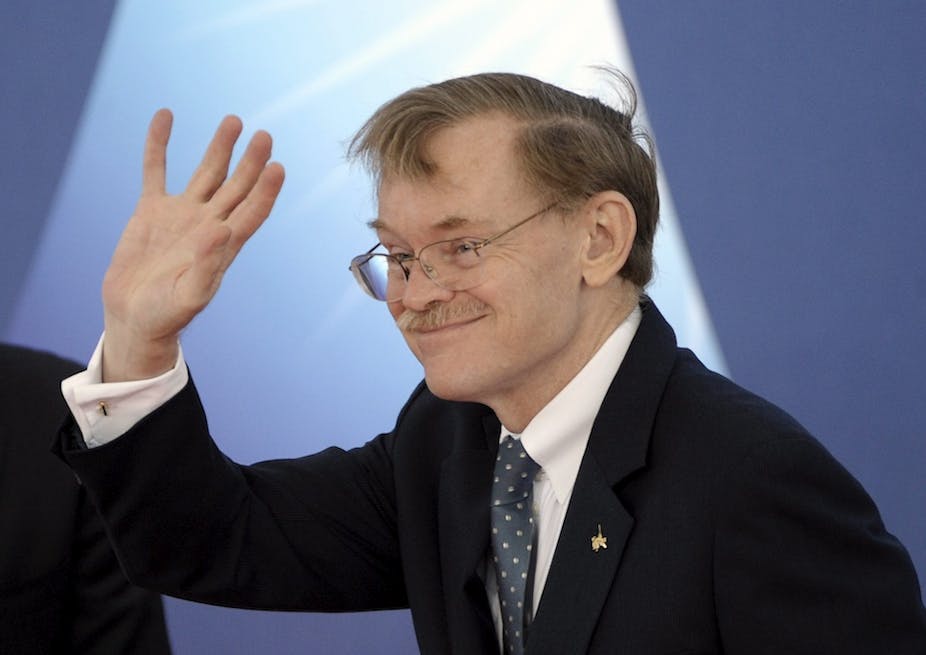When World Bank President Robert Zoellick announced his resignation last week, a surprising number of names emerged as contenders for the Bank’s top job. Zoellick’s resignation doesn’t come into effect until July, so there’s plenty of time for political manoeuvring.
Traditionally, the president of the International Bank for Reconstruction and Development – better known as the World Bank – has been an American appointee. Every single Bank president has been an American. Why? Because the deal was done at the Bretton Woods conference in 1944. At Bretton Woods, the Europeans secured the right to appoint the managing director of the IMF (almost always a Frenchman or woman); neutral or non-aligned countries supply the UN Secretary-General; and the Director-General of the GATT/WTO comes from the OECD (only one exception: Thailand’s Supachai Panitchpakdi).
Zoellick’s legacy
Zoellick came to the World Bank presidency with impressive credentials. He was a forceful US Trade Representative – a Cabinet-level position – under George W Bush’s first administration. When New Zealand Prime Minister Helen Clark publicly criticised Bush’s “War on Terror” on the eve of the Iraq war in February 2003, Zoellick was characteristically blunt: New Zealand would go to the back of the queue of countries seeking a free-trade agreement with Washington.
Three years later, Zoellick hadn’t changed his mind. In 2005, Zoellick was promoted to Deputy Secretary of State under Condoleezza Rice. More recently, as World Bank President, Zoellick has worked quietly but effectively, expanding the Bank’s focus upon dealing with African poverty and development, while boosting its lending capacity.

When Zoellick arrived at the World Bank in 2007, the institution had experienced a decade of controversy and internecine fighting with its sister organisation, the IMF. World Bank chief economist, Joseph Stiglitz, had bitterly criticised the IMF for its prescriptions during the Asian, Russian and Argentine financial crises of the late 1990s and early 2000s (detailed in Stiglitz’s subsequent book, Globalization and its Discontents). The IMF’s Research Director, Ken Rogoff, struck back at Stiglitz with an open letter. Irrespective of who was the hero and who was the villain, the dispute lifted the veil of secrecy on two of the world’s most powerful financial institutions.
The controversy at the Bank did not end with Stiglitz’s book. As Bank president, Zoellick replaced the controversial George W Bush appointee, Paul Wolfowitz, who was compelled to resign after Bank staff complained about the pay rises given to Shaha Riza, with whom Wolfowitz was involved romantically. Scandals such as these are becoming increasingly common in the world’s international institutions. Former UN Secretary-General Kofi Annan’s son was mired in a scandal involving the Iraq oil-for-food program, while in 2011 IMF Managing Director Dominique Strauss-Kahn resigned in the face of alleged rape charges, although the case against him subsequently collapsed.
The contenders
US Treasury Secretary Timothy Geithner has been touted as a future World Bank president, but Geithner hasn’t made any secret of his desire to get out of Washington, and the Bank job would preclude that. Larry Summers, once Obama’s key economic adviser, is a possible contender, but his White House enemies have been running a campaign of subterfuge against him since 2010, highlighting his profitable relationship with Wall Street during the Democrats’ wilderness years under George W Bush presidency.

Hillary Clinton has indicated she won’t be seeking political office once her term as Secretary of State ends. This opens the door to the World Bank presidency, although Obama would need to appoint an interim president until January 2013. Despite the fact that Bank HQ is in Washington, this jet-setting post would keep Hillary out of Washington and put a lid on those pesky Clintons controlling the Democratic Party – which they have, frankly, for the best part of 20 years.
The outsiders
Agustin Carstens, Mexican central bank chief, is a dark horse, having lost the IMF contest to French finance minister Christine Lagarde in 2011 when she replaced Strauss-Kahn. But the smart money seems to be on Lula da Silva, as Obama reportedly backs the former Brazilian president for the job. That said, da Silva has recently fought throat cancer and he would need to serve a demanding five-year term in office. Meanwhile, the Brazilian government itself is pushing for an appointee from a developing country.
Without any apparent irony, the official Chinese news agency, Xinhua, this week called for “democracy in the World Bank presidential selection process, labelling the 1944 Bretton Woods deal "outdated”.
The World Bank itself hopes the appointment, to be announced by 20 April, will be made on “merit”, but that’s a position that is hopelessly at odds with reality. Given Washington’s stranglehold on the job, the most likely outcome is that an American candidate will secure the presidency.
Nevertheless, there’s a chance Obama will want to break the mould and build his credentials with Latin America by appointing da Silva. On the other hand, this is an election year, and Congress – particularly a Republican Congress – would make Bank funding seem like pulling teeth if a non-American were appointed to the presidency.
An old aphorism that’s long done the rounds at the World Bank and IMF may prove useful here: if the Americans want it to happen, it will happen. If they’re slightly against it, it might happen. And if they’re dead against it, it won’t happen.

